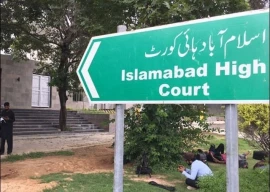
Flanked by the entire roster of Supreme Court judges, Chief Justice Iftikhar Muhammad Chaudhry asserted the judiciary’s jurisdiction on Thursday, reminding ‘certain quarters’ of the courts’ constitutional mandate to ensure that institutions function inside their limits.
Announcing adjournment of all cases at 11am on Thursday, the chief justice convened an extraordinary and unscheduled full-court session to discuss important issues.
“As per the prescribed principles enshrined in the Constitution, every organ of the state has to perform its duties and functions within the mandated sphere,” a press release issued after the meeting stated.
“The superior judiciary enjoys cross-cutting jurisdiction empowering it to carry out the role of oversight and ensure that no institution or department or authority may interfere in the domain of the other and further to check the unlawful or unauthorised or malafide act or exercise of authority,” the statement added.
Without naming any institutions, Thursday’s full-court meeting reasserted that the Supreme Court is a constitutional body that has constitutionally guaranteed jurisdictions – a power that must be exercised in an independent and effective manner without fear or favour.
“The present day judiciary is looked upon as one institution which is delivering services to the people in an active manner. Therefore, it is incumbent upon the judiciary to come up to the peoples’ expectations and become a role model for all other institutions to follow,” the statement read.
The statement comes days after a controversial statement by the army chief that no single institution or individual can, or should, determine the country’s national interest – which many analysts concluded was a remark pointed at the judiciary and the chief justice – particularly because it came following the verdict on the Asghar Khan case that found top military generals guilty for manipulating the 1990 general elections.
The Supreme Court’s judgment in the Balochistan law and order case and the Islamabad High Court’s recent move to accept a petition against the two-year service extension of Gen Kayani are being considered reasons for a friction between the two institutions.
The chief justice seemed to have a reply for this.
“Although no one institution has the capacity to provide good governance single-handedly, yet the institution of the judiciary, due to its credibility and institutional mandate, can inspire all others to do their duties in a transparent manner,” it added.
Earlier, on Wednesday, the Rawalpindi Bar Council unanimously passed a hard-hitting resolution against Gen Kayani’s statement and warned the top military leadership to avoid confrontation.
Issue of pending cases
According to the press release, the institution, disposal and pendency of cases was at the top of the meeting’s agenda.
Notwithstanding the disposal of a significant number of cases due to what was termed the hard work of judges, there is discernable trend of rising institution, the meeting noted.
The statement added that the rising institution is primarily on account of disposal of cases in a large number by high courts and also due to the invocation of Article 184 (3) which involves issues of public importance as well as petitions and applications received from the deprived, under-privileged and vulnerable sections of society.
This, the meeting noted, was indicative of public trust in the ability and capacity of the Supreme Court to grant relief and redress grievances.
The meeting was told that the prime minister has been approached to issue directions for the allocation of required funds to recruit additional judicial officers.
The meeting noted, with satisfaction, that the court decided 12,377 cases out of a total of 13,653 cases filed between January 1, 2012 and November 10, 2012.
It was resolved that two to three-member benches – two in Lahore and one in Peshawar – would be constituted for three months to reduce the backlog.
Published in The Express Tribune, November 16th, 2012.
COMMENTS (6)
Comments are moderated and generally will be posted if they are on-topic and not abusive.
For more information, please see our Comments FAQ




1732781717-0/BeFunky-collage-(2)1732781717-0-165x106.webp)
1732780655-0/Express-Tribune-(5)1732780655-0-270x192.webp)











@Shahzad:Interestingly, you also found this important enough from Dar to quote ".....is our judiciary and the legal profession from which it emanates, committed exclusively to “values of legality” rather than to nurturing populist aspirations?".......NOW DON'T WE ALL SEE WHAT IS MOTIVATING THE PRESENT JUDICIARY AND EVEN THE LAWYERS, A LARGE NUMBER, IT CERTAINLY IS NOT "values of legality" But "populist aspiration", I'D SAY A BIT MORE BLUNTLY -------- they are driven by ----- CHEAP POPULISM!
Neither I have faith in judiciary of Pakistan nor can any one coerce me to respect it. My gauge for judiciary is justice to common men like me. I am not interested in its battles with other institutions nor are we the cheerleaders hired by them. The record of last five years has seen no change in the plight of people of Pakistan. While Judiciary may have won the battles from the sitting government, it has lost the war of the justice in the peoples arena.
what about the pending cases.....
Maybe we need to read what was written by Amber Darr in yesterday's ET titled " The ever elusive Rule Of Law" I have reproduced the last paragraph therefrom
"The success of this model, however, neither lies in the number of times it is reiterated nor in the identities of those who do so, but in understanding and observing its inherent limits. Is our parliament ready or equipped to enact laws that reflect the interests of the people and protect their welfare, rather than merely benefit those in power? Is our executive (and this includes the army) prepared to observe the limits prescribed by the law, rather than to assert its supremacy? Most importantly, is our judiciary and the legal profession from which it emanates, committed exclusively to “values of legality” rather than to nurturing populist aspirations? If even one of these is missing, the refrain of our commitment to the Rule of Law will remain nothing more than verbiage with which we hope to fool only our critics but also ourselves into thinking that we, too, rank amongst civilised nations of the world."
And a suggestion equanimity to be exercised by all.
“Although no one institution has the capacity to provide good governance single-handedly, yet the institution of the judiciary, due to its credibility and institutional mandate, can inspire all others to do their duties in a transparent manner,” it added."
Can a lawyer please explain where the honourable lordships have taken the following from " due to its credibility and institutional mandate"
I hope to see a more effective and efficient Judiciary providing strict decision on cases and setting the example for others. Justice delayed or Soft judgement or providing recurring date hearing after hearing will not land you respect but make you more questionable in the eyes of people of Pakistan. I don't see example where once judgement is made on a case - party is given 2 years to have court decision implemented and above all - hearing dates were given like charity - This is not the way of efficient or effective Judiciary.